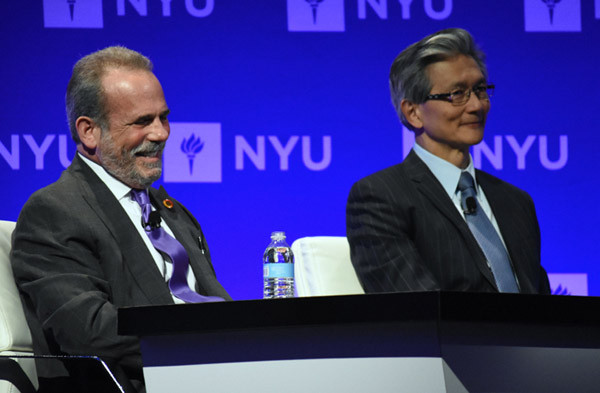✕

Column: industry Tag: hotel industry,guest experience,technology,Health and wellness Published: 2017-06-16 17:28 Source: Author:

Eric Danziger of Trump Hotels, left, laughs with David Kong of Best Western Hotels & Resorts during a discussion in the Leaders’ Forum on the second day of the NYU International Hospitality Industry Investment Conference. (Photo: Bryan Wroten)
NEW YORK—Whatever new development finds its way into the hotel industry, above all else, it should come down to how it improves the guest experience, according to hotel executives speaking at this year’s NYU International Hospitality Industry Investment Conference.?
During the Leaders’ Forum on the second day?of the conference, the executives expounded on their investments in technology and exploration of health and wellness and how it all relates to what it means for guests.
Technology and customer service
Four Seasons Hotels and Resorts lacks the scale of the big players and its ability to invest in new technology, said President and CEO J. Allen Smith, so the company has to be strategic in the new pieces of technology in which it invests. The company only has a fraction of the hundreds of millions other brands might have in their technology budgets, he said, which means differentiating itself and creating a clear point of view among guests of what Four Seasons?is.
Mandarin Oriental Hotel Group doesn’t need to be a leader in technology, Group Chief Executive James Riley said, echoing Smith’s sentiments, though it is alert to new developments. From his point of view, it’s dangerous for the company to attempt to lead with technology initiatives on a modest budget against the larger players.
“What we want to be able to use technology for is to help deliver the guest experience through staff and empathy,” Riley said. “The staff is the most valuable asset we have.”
On the opposite end of the spectrum, MGM International Chairman and CEO James Murren said his company’s larger resorts work with tech companies to beta test new technology. The company’s batting average is about .300, he said.
“We are bleeding edge sometimes,” Murren said. “Our batting average is maybe not quite .300. What comes out of that, whether it’s virtual reality or other customer interactions, we can incubate some of those ideas and then deploy them into our resort brands.”
All investment has to have a return, said David Kong, president and CEO of Best Western Hotels & Resorts. It requires thinking about how people like to use different technology and then deciding whether it has relevance in hotels and how it could create a better guest experience, he said.
When investing in new technology, Best Western?maps out the whole customer journey, from when they’re thinking about planning a trip to after they’ve returned home. Best Western isn’t bothering with a brand app, Kong said, because the average person has about 30 apps on their smartphone but it’s questionable how many of them people actually use. Instead, the company is focusing on a messaging platform to communicate with guests, allowing it to send welcome messages to guests upon arrival and learn about any concerns.
Trump Hotels CEO Eric Danziger said while he agrees with the need for personal technology, the business everyone is in is hospitality. He spoke of a trip to San Antonio, Texas, and the hotel room he checked in to was dirty. Because no other room was available, Danziger had to wait an hour and a half for someone to clean it. Roomservice took 55 minutes for a simple sandwich and a salad, he added.
“If it isn’t about great people doing great, dependable, reliable hospitality service, it doesn’t matter,” he said. “I really tend to focus on whatever we create, it needs to be executed flawlessly. The ultimate return is delivering on the promise.”
It’s important for hotel employees to feel passion for the service, Danziger said. They need to have that on their own while the company can teach them everything else.
Health and wellness
The spa and wellness dimension is an important one, Smith said, as it goes back to the total experience. The manner in which it integrates everything from nutrition to fitness to other dimensions of wellness continues to grow.
In addressing the concept of branded hospitals, Smith said his company has no plans to follow this path.
“I do think we’ll see this kind of continued enrichment to the experience,” he said. “We have some owners we’re working with who are exploring developing spas that go more toward the medical side than what it is today. We’ll see how it goes.”
If the company were to move in that direction, he said, it would partner with people who are the best at delivering that kind of programming.
There will be opportunity for hospitality experts to provide support in health care, Riley said. In the medical setting, employee expertise is delivering health care, not hospitality, he said.
“Longer-stay residents want to be treated, but they also want to experience a comfortable experience all the while,” he said. “The challenge is how to marry the two. I would be very cautious to any hospitality expert getting involved in the medical side.”
Many luxury hotel companies are focusing on wellness, Riley said, and “the challenge is how we deliver it so it doesn’t become a focus that somehow the brand is all about wellness and you’re coming in for a detox when you’re coming to one of our hotels.”
Hoteliers should make sure they’re not forcing a regime on guests that is not their choice, he said.
Previous:Sandals signs first ever GDS deal with Travelport
Next:STR: US hotel results for week ending 10 June
Hot key words
Hot Products
Popular Vendors